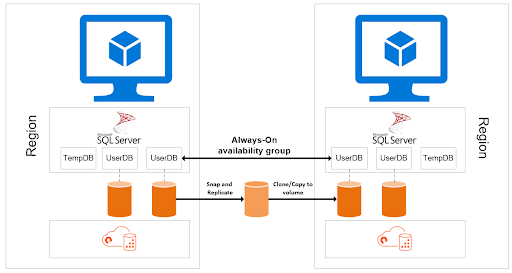Cloud computing has completely upended the IT industry over the last 10 years due to a number of reasons:
- IT staff want to focus on ensuring the business can pursue its core objectives, not spend their time fixing and upgrading physical servers.
- Cloud services are very fast to sign up for. This eliminates wait times to get critical operations online and scaling business functions has a much shorter turnaround time.
Microsoft Azure is a cloud computing service offered by Microsoft that provides software as a service (SaaS), platform as a service (PaaS), and infrastructure as a service (IaaS). Its popularity is due to the comprehensiveness of the services offered, the scalability and flexibility of various resources, and the overall simplicity of its use.
Pure Cloud Block Store™ provides seamless data mobility across on-premises and cloud environments with a consistent experience regardless of where data lives. Pure Cloud Block Store is available in two versions, //V10 and //V20, in the Microsoft Azure Marketplace for Microsoft Azure deployments.
Figure 1: The //V10 and //V20 versions of Pure Cloud Block Store. The capacity listed for each model is effective capacity with a 4:1 data reduction rate.
Microsoft SQL Server deployed into an Azure virtual machine can make use of storage provided by Pure Cloud Block Store. The benefits of using Pure Cloud Block Store volumes for SQL Server database storage include, but are not limited to, greater storage efficiency and increased storage availability.
The data services provided with any Pure Cloud Block Store instance can be used for a number of use cases with Microsoft SQL Server:
- Data protection and disaster recovery: Replicated or offloaded volume snapshots or continuous replication using ActiveDR™ can be implemented for database volumes.
- Seeding Always On availability groups: Using volume snapshot cloning, data can be efficiently copied from a primary system to an intended replica in an Always On configuration.
- Cloning databases: The volumes on which databases are located can be cloned from volume snapshots and attached to different instances to facilitate rapid and efficient cloning.
- Higher availability: Synchronous replication can be implemented between two Pure Cloud Block Store instances to ensure that, in the event of an availability zone outage, the storage remains accessible to SQL Server.
Cost-effective Disaster Recovery
This blog post will focus on the use of two or more Pure Cloud Block Store instances in different Microsoft Azure availability zones or regions to achieve cost-effective disaster recovery for Microsoft SQL Server instances.
Pure Cloud Block Store provides the following benefits to SQL Server instances that utilize its volumes for database files:
- A reduction in cost for cross availability zone/region traffic and capacity consumption
- More efficient data movement, resulting in more consistent recovery point objectives
For software replication with Always On availability groups across regions in Microsoft SQL Server 2022, the following benefits can be realized:
- Volume snapshots and asynchronous replication can be used to ensure that, after failover, disaster recovery posture can be regained rapidly.
- Seeding and reseeding times can be drastically minimized.
The FlashArray™ Management Extension for Microsoft SQL Server Management Studio can be used to aid in the creation of application-consistent volume snapshots.
The cost-effectiveness and efficiency of the disaster recovery capabilities in Pure Cloud Block Store are entirely down to how data reduction is built into all aspects of the product. For raw storage capacity, only unique data is stored after compression and deduplication, resulting in a much larger usable storage capacity being available. For data transferred, only data unique to the target location (another FlashArray system, Pure Cloud Block Store storage, or a CloudSnap™ offload target) is sent over the wire—reducing the transfer time and any associated costs.
To implement disaster recovery capabilities for Microsoft SQL Server, the following data services can be used:
Asynchronous Replication
In asynchronous replication, volume snapshots are copied from one FlashArray or Pure Cloud Block Store instance to another. This replication type can provide recovery point objectives as low as five minutes. Volume snapshots can be instantly created or recovered and are storage space and transport efficient.

Figure 2: Asynchronous replication of volume snapshots from a source to a target.
ActiveDR Continuous Replication
ActiveDR provides continuously active replication capabilities for block storage volumes from one FlashArray or Pure Cloud Block Store instance to another with no impact on front-end application performance. This replication type can provide near-zero recovery point objectives.
Multiple recovery point objectives for greater resiliency can be achieved through the combination of asynchronous replication and ActiveDR continuous replication.

Figure 3: Continuous replication of volumes from a source to a target.
Seeding Always On Availability Group Replicas
Always On availability groups are a feature in SQL Server that provide a replicated environment for a discrete set of user databases. Availability groups can be created to provide high availability, read scale, or disaster recovery.
SQL Server instances utilizing Always On availability groups can be combined with Pure Cloud Block Store data services to lower costs and increase efficiency. Volume snapshots can be used to replace the automatic seeding and reseeding of always-on databases while providing a more efficient method of reestablishing a disaster recovery posture in the event of an outage.

Figure 4: High-level diagram of public cloud infrastructure being used for storage and software replication.
Combining Pure Cloud Block Store with Microsoft SQL Server in Microsoft Azure allows for disaster recovery capabilities to be implemented in an efficient and cost-effective manner. For more information on how Pure Cloud Block Store can improve the resiliency of your business operations, read the technical white paper “Intra-cloud Disaster Recovery for Microsoft SQL Server.”
![]()







